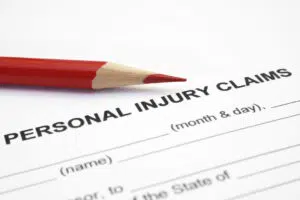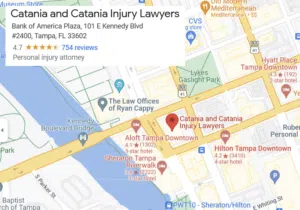
When you are injured in an accident in Florida, you may have questions about who is responsible for your injuries, lost wages, and medical expenses. Under Florida’s personal injury laws, the person who caused your accident can be held liable for your pain and suffering, financial losses, and other damages.
Our Tampa personal injury attorneys take the time to answer your questions about a personal injury claim. During your initial consultation, we can discuss your personal injury case in detail.
But for now, our experienced lawyers have compiled answers to some of the most common questions we receive from injury victims. If you would like to learn more about personal injury cases and your legal rights, contact our Tampa office at Catania and Catania Injury Lawyers, or call us at (813) 222-8656 for a free consultation.
Table of Contents
What is Personal Injury Law?

Personal injury law focuses on making victims “whole.” It is impossible for the judicial system to undo the injuries caused by another party’s mistakes, negligence, or wrongdoing.
However, the judicial system can hold the at-fault party financially responsible for damages caused by the party’s actions. Personal injury law is the process of filing claims and recovering compensation for damages.
How Do I Know If I Have a Personal Injury Case?
The best way to know if you have a claim is to talk to the personal injury attorneys of Catania & Catania Injury Lawyers. We offer free initial consultations and case reviews.
Our lawyers carefully analyze the facts of your case to determine whether you have a claim. We look at every aspect of what happened to you to identify each cause of action that might provide compensation for your damages.
We also analyze the case to identify each party who might have some liability for your claim. By identifying all labile parties, we increase the chance you can recover full compensation for all damages.
Who Can File a Personal Injury Claim?
Anyone who sustains an injury because of another party’s actions can file a personal injury claim. However, children and mentally incapacitated individuals do not have the standing to file legal actions. Therefore, a parent, legal guardian, or court-appointed representative would need to file the action on their behalf.
Why Should I File a Personal Injury Claim in Tampa?
The cost of treating injuries after an accident can be substantial. Many accident victims incur financial hardships because of their medical bills and lost income after a personal injury.
Filing a personal injury claim is the first step in recovering compensation for your damages. You should not have to bear the cost of an accident caused by another person. You should also not be required to handle the legal matter on your own. Hiring an attorney to fight for your damages gives you the ability to focus on yourself and your family.
What Types of Accidents or Situations Lead to a Personal Injury Claim?
Thousands of individuals are injured in accidents in Tampa and throughout Florida each year. The type of accident may vary, but the result is the same: victims experience unnecessary pain and suffering because of another party’s negligence and wrongdoing.
Examples of accidents that can lead to a personal injury claim include:
- Car accidents
- Medical malpractice
- Truck accidents
- Defective product injuries
- Pedestrian accidents
- Premises liability claims
- Slip and fall accidents
- Bicycle crashes
- Dog bites and attacks
- Motorcycle accidents
- Construction accidents
- Boating accidents
If a person dies in an accident, the family members may file a wrongful death claim against the at-fault parties. The wrongful death claim may arise from one of the above accidents or another incident.
What is the Burden of Proof in Personal Injury Cases?
Florida personal injury laws require that you prove the other party caused your injuries before you can recover compensation for damages. The standard of proof for personal injury claims is a preponderance of the evidence.
Instead of proving beyond a shadow of a doubt that the other party caused your injuries, you only need to prove that there is a greater than 50 percent chance the other party is responsible.
There could be incidents when the burden of proof shifts. In cases involving negligence per se, the burden shifts to the defendant to prove they did not cause your injury. The defendant is presumed to be negligent because they broke a law designed to protect the public interest when they caused your harm.
How Do I Prove Fault in a Personal Injury Case?
Most personal injury cases are based on negligence and strict liability claims.
Negligence
Negligence requires that you prove the following four legal elements:
Duty of Care
The other party owed you a duty of care. A duty of care requires that the other party acts in a manner that does not place others in danger. For example, drivers have a duty of care to follow traffic laws and property owners have a duty of care to maintain safe premises.
Breach of the Duty of Care
The other person’s actions failed to meet the reasonable person standard. When you compare the other party’s actions to what a reasonable, prudent person would have done in the same or similar situation, the other party’s actions fell short.
In other words, the party failed to act with the level of care required for a specific situation. For example, a breach of the duty of care might include distracted driving, performing surgery while intoxicated, or leaving a live wire exposed in a restaurant bathroom.
Causation
You must prove that the person’s conduct was the direct and proximate cause of your injuries. In addition, there must be a direct link between the breach of the duty of care and the accident or incident that caused your injury.
A weaker standard is the “but for” test. This test analyzes whether or not you would have been injured “but for” the other party’s conduct.
Damages
You must prove that you sustained damages because of the other party’s actions. Damages can include economic damages and non-economic damages, including the examples we discussed above.
Negligence Per Se
You can also prove fault by alleging negligence per se. If a person is negligent per se, they are presumed to be liable for your damages because they are guilty of breaking a public interest law as part of the breach of duty.
For example, drunk driving laws are designed to protect the public. If a person was intoxicated at the time of a car accident, the person might be presumed negligent. The burden shifts to the other drive to prove he did not cause the car crash.
Strict Liability
Strict liability holds a party responsible for damages once you prove that the party caused your harm. You do not need to prove intent, nor do you need to prove that the party knew or should have known about the harm.
Strict liability applies in product liability cases and cases involving dog bites. As a result, manufacturers and dog owners can be held liable for damages without proving they were negligent.
How Can A Personal Injury Attorney Help Me with My Claim?
Dealing with a personal injury claim can be overwhelming. A skilled personal injury attorney can help you fight for the compensation you deserve.
Our legal team handles all aspects of your personal injury case including, but not limited to:
- Conducting a comprehensive investigation into the cause of your injuries
- Identifying each party who might be liable for your damages
- Filing a claim with each insurance company that provides coverage for the accident
- Gathering and preserving evidence to prove the legal elements of negligence
- Handling all communications with the insurance companies and other parties
- Fighting allegations of comparative fault
- Providing you with legal advice, support, and guidance as we go through the claims process
- Keeping you updated on the progress of your case
- Calculating and monitoring deadlines for filing claims and lawsuits under the statute of limitations
- Working with your physicians and other experts to document the severity of your injuries and damages
- Calculating the maximum value for your injury claim
- Aggressively negotiating a settlement that compensates you for all damages
- Representing you in court, if necessary
Having a legal team to help you handle the steps of a personal injury case can relieve the stress you might feel after an accident. Instead of focusing on the claim, you can focus on healing from your injuries. Hiring a Tampa personal injury attorney can give you a better chance of obtaining a positive outcome for your case.
How Much Will I Have to Pay to Hire a Personal Injury Lawyer?
Many people worry about the cost of hiring a personal injury attorney. However, most personal injury attorneys in Florida accept cases on a contingency fee basis.
A contingency fee means that you do not owe any money unless the attorney recovers money for your claim. When you recover money for your claim, you pay the attorney an agreed-upon percentage of the amount. If the attorney does not recover any money, you do not owe any attorneys’ fees.
How Much is My Personal Injury Case Worth?
This question is one of the most common questions in personal injury. Unfortunately, we cannot answer it during your first appointment. The value of your personal injury claim depends on your damages and other factors in your case. We want to learn as much as possible to ensure we calculate the maximum value for your injury claim.
We understand that you want to know who pays your medical bills or replaces your lost income. However, we want to ensure that we put your best interests first. Therefore, we do not calculate the value of your injury claim until we have all the evidence related to your case and your complete medical treatment. Until then, it is impossible to know the maximum value of your injury claim.
What Kind of Damages Can I Receive After My Accident?
While we can’t tell you the value of your case right away, we can explain the types of damages you might receive and the factors that impact the value of injury claims.
Examples of damages included in a personal injury claim are:
- Past and future medical expenses
- Ongoing costs of personal care
- Costs of physical and rehabilitation therapies
- Past and future losses of income and benefits
- A decrease in your future earning potential
- Permanent disabilities, impairments, and disfigurement
- Pain and suffering damages, including mental anguish, emotional distress, and physical discomfort
- Loss of enjoyment of life and decrease in the quality of life
A good rule of thumb is that cases involving catastrophic or permanent impairments are worth more than cases involving minor injuries and minimum financial damages.
Many factors impact the value of an injury claim. Some factors that could impact the amount of money you receive include:
- The total value of economic losses
- The severity and type of injuries
- Whether you contributed to the cause of the accident
- The impact the injuries will have on your career and quality of life
- The availability of insurance coverage
- The amount of time you missed from work
- The parties involved in the case
A personal injury case and a property damage claim are two different cases. In most situations, a property damage claim is settled before the personal injury claim. We need to wait until you complete medical treatment to understand the extent of your damages and losses.
Our legal team carefully documents all damages and calculates the maximum value for each type of damage. We may retain medical experts and economists to assist in calculating past and future damages.
Can I Still Get Money I’m Blamed For an Accident in Florida?
Each state has various laws that govern personal injury claims.
For example, Florida’s pure comparative fault law allows accident victims to recover some of their damages even if they are partially to blame for the accident. Some states bar recovery of any compensation for damages if the victim is even one percent at fault.
Allegations of comparative fault can reduce the value of your claim. It is essential that you contact a personal injury lawyer immediately if the insurance company or another party tries to blame you for your injuries.
Is There a Deadline for Filing Personal Injury Lawsuits in Florida?
Yes, there is a deadline for filing personal injury lawsuits in Florida. The deadline, known as the statute of limitations, is four years from the injury date for most personal injury lawsuits. However, there are exceptions.
Wrongful death claims must be filed within two years of the date of death. Notice of claims involving government entities generally need to be filed within a few months of the date of injury. It is best to talk to a personal injury lawyer as soon as possible to avoid missing a deadline and losing your right to file a claim.
How Much is My Accident Case Worth?
Many factors impact the value of a personal injury case. Factors that could impact how much your case is worth include:
- The severity and type of your injuries
- The duration of your recovery
- Whether you sustained permanent impairments or disabilities
- The availability of insurance coverage
- The parties involved in the case
- Did you sustain psychological injuries in addition to physical injuries?
- Were you partially at fault for the cause of your injury?
Our legal team at Catania & Catania Injury Lawyers works to maximize the factor that can increase the value of your claim while minimizing the factors that could lower the value of your claim.
How Long Will My Case Take and When Will I Receive My Settlement or Jury Award?
Each personal injury case is unique.
If your case involves any of the following elements, it could take longer to resolve:
- You sustained catastrophic injuries
- A child was injured in the accident
- Liability for the cause of the accident is disputed
- You sustained permanent disabilities or impairments
- A government entity is a party to the case
- Multiple parties could be liable for your injuries
- We file a personal injury lawsuit because the other party refuses to negotiate in good faith
We understand that you want and need your compensation as quickly as possible. Therefore, we diligently work to resolve your injury case as soon as possible.
However, we do not rush cases just to recover money. Instead, our goal is to recover the most money for your claim as possible.
You will receive your settlement proceeds after the case is complete. We must pay any outstanding medical bills and costs of the case before issuing you a check.
Contact Our Tampa Personal Injury Attorney for a Free Consultation
If you have questions about a personal injury case, we encourage you to reach out to our office. Our legal team has years of experience handling injury cases. Schedule your free consultation to speak with a personal injury attorney in Tampa.




